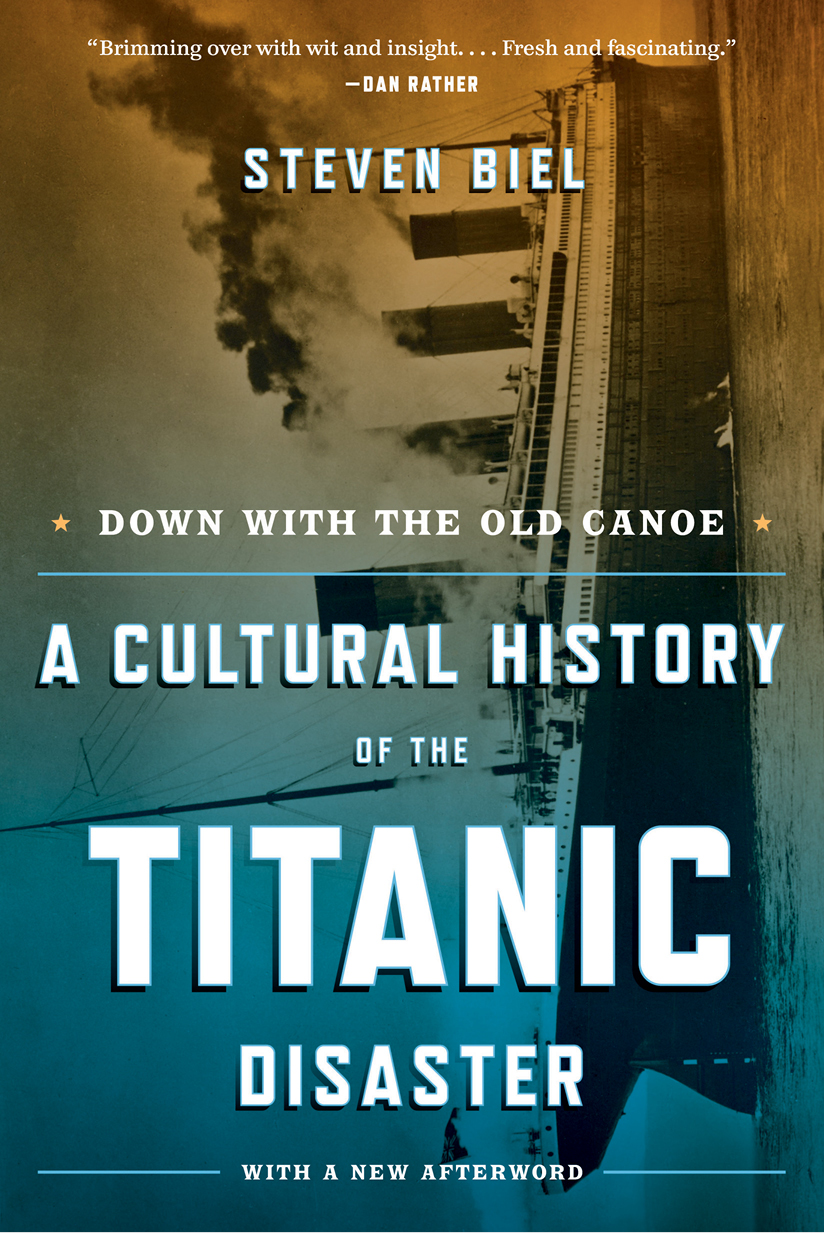
A LSO BY S TEVEN B IEL
Independent Intellectuals in the United States, 19101945
American Gothic: A Life of Americas Most Famous Painting
American Disasters
Titanica: The Disaster of the Century in Poetry, Song,
and Prose
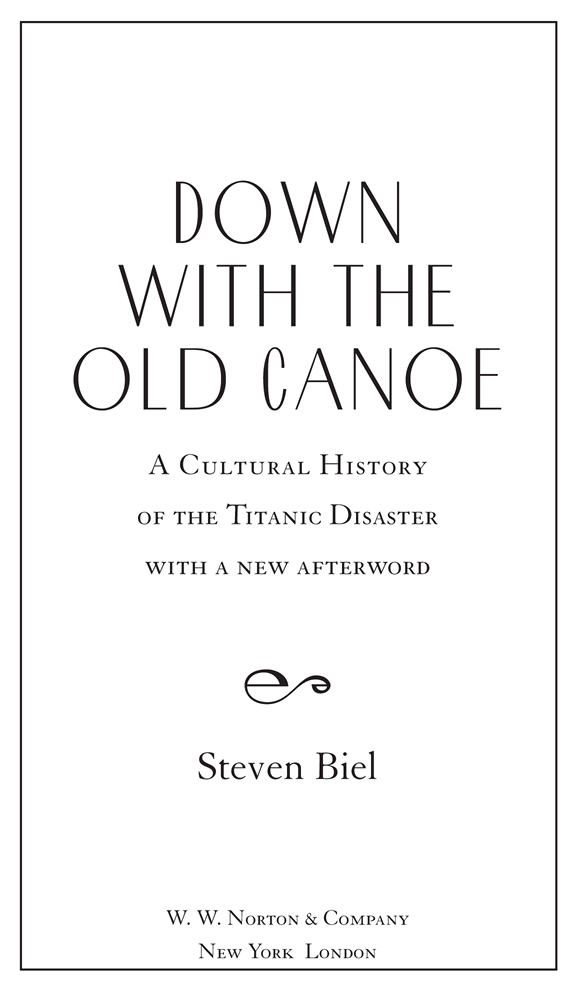
For Olivia, Jake,
and Alexandra
CONTENTS
Hello, hello! I see the Titanic s sunk again.
British comedian Peter Cook,
imagining a 1950s suburbanites
response to the headline
of his morning paper
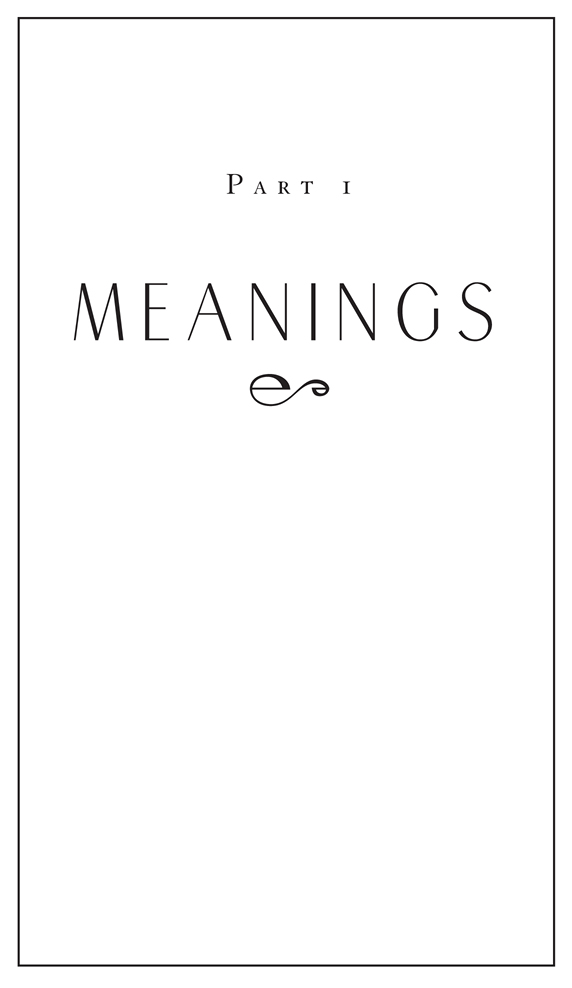
F OREWORD
NATURE JEERS AT
OUR FOLLY
 Seventy-four years old in 1912, Henry Adams felt as much enthusiasm for crossing to Europe on the Titanic as an old man who believed that the world was collapsing could muster. The Titanic would leave New York on April 20, after its maiden voyage from England. I think I shall take rooms on it, by way of venture, Adams wrote his confidante Elizabeth Cameron. With the rivalry between William Howard Taft and Theodore Roosevelt splitting the Republican party, Adams was convinced now more than ever that society had become incapable of managing its own affairs. A trip to Paris, he hoped, would take his mind off the dismal state of politics and society. In March a British coal strike threatened to delay his escape, and April 20 seemed too far off as it was. I hope that it cant last beyond April 1, and that the Titanic will sail on time. If not, I shall be in a mess. The purpose of the strike, he imagined, was to prove the power of international organized labor, which one day soon would call a general strike and give the coup-de-grace to our society. Still, he hoped that the bothersome workers would save their coup de grace for later and that he would sail as planned. When he learned that the Titanic had set out on April 10, he felt certain that unless she drops me somewhere else, he would be in France in a fortnight.
Seventy-four years old in 1912, Henry Adams felt as much enthusiasm for crossing to Europe on the Titanic as an old man who believed that the world was collapsing could muster. The Titanic would leave New York on April 20, after its maiden voyage from England. I think I shall take rooms on it, by way of venture, Adams wrote his confidante Elizabeth Cameron. With the rivalry between William Howard Taft and Theodore Roosevelt splitting the Republican party, Adams was convinced now more than ever that society had become incapable of managing its own affairs. A trip to Paris, he hoped, would take his mind off the dismal state of politics and society. In March a British coal strike threatened to delay his escape, and April 20 seemed too far off as it was. I hope that it cant last beyond April 1, and that the Titanic will sail on time. If not, I shall be in a mess. The purpose of the strike, he imagined, was to prove the power of international organized labor, which one day soon would call a general strike and give the coup-de-grace to our society. Still, he hoped that the bothersome workers would save their coup de grace for later and that he would sail as planned. When he learned that the Titanic had set out on April 10, he felt certain that unless she drops me somewhere else, he would be in France in a fortnight.
Adams received the news of the Titanic disaster with shock and an agonized kind of satisfaction. The Titanic is wrecked, he proclaimed, and then connected it to Roosevelts victory in the Pennsylvania primary; so is Taft; so is the Republican party; all in one brief hour.... We all foundered and disappeared. As a man who had predicted and reveled in catastrophe and decay for years, and who had constructed an image of himself as a holdover from the eighteenth century in a chaotic modern world, Adams could not help deriving an anguished thrill from the disasters that had befallen the ship and the beloved party that his father had helped create. His letters almost quiver with the delightful shudder he felt. By my blessed Virgin, it is awful! This Titanic blow shatters ones nerves. We cant grapple it. Taft, Titanic! TitanicTaft!
The metaphorical possibilities of the disaster proved irresistible. The Titanic , Taft (both immense, both sunk), the Republican party, Henry Adams, society, the predictable and secure world of the nineteenth centuryall had crashed and foundered. The republican party is at the bottom of the deep sea, and the corpses are still howling on the surface. Whatever happens, our old party is done. Our society has politically run on an iceberg, and the confusion and darkness are fatal. Adams, the self-described anachronism, regretted his narrow evasion of an exquisitely appropriate death on the Titanic ; he had missed the boat again. But he also basked with wicked delight in continuing to have lived too long. He booked passage on the Olympic , the Titanic s sister ship, and dramatically announced to his friends his hope that it too would sink. A noble nineteenth-century death, at any rate, would be better than the ignominious twentieth-century death that he was bound to suffer and that he summed up in a racist joke: It will be a good job anyway if it saves one from being mangled by a nigger in an auto-taxi.
Most tormenting of all was that he could not gloat. The disaster had upset his friends so much that he was denied his sole compensation; he couldnt even tell them:I told you so! And Adams had told them so, seven years earlier, in his Education , wherechallenging the sacred American belief in progresshe predicted that humanity in the twentieth century would fall prey to technologies it lacked the wisdom to control: Every day Nature violently revolted, causing so-called accidents with enormous destruction of property and life, while plainly laughing at man, who helplessly groaned and shrieked and shuddered, but never for a single instant could stop. The Titanic had vindicated his pessimism, but it was a lusterless vindication that he could share with only a few of his friends. The sum and triumph of our civilization, guaranteed to be safe and perfect, our greatest achievement, he now observed, sinks at a touch, and drowns us, while nature jeers at our folly.
A writer of historical fiction, with the freedom to choose characters and create situations, could not do better than to give Henry Adams a ticket for the Titanic . The only possible improvement might be to put him on board and let him go down with the ship, but then, unless the writer allowed him an interior monologue in his final moments, we would be denied his ruminations on the disaster. Adams, Americas most eloquent critic of technology and progress, booked reservations for the never-to-be return voyage of the unsinkable triumph of modern shipbuilding.
Nine days after the Titanic sank, Adams suffered a stroke. In his delirium he thought that his mother had gone down with the ship, and he tried to communicate with her. Fearing that he was losing his mind, he attempted suicide. The convalescent Adams wasnt aboard the Olympic , which didnt sink in any event. He recovered and lived for another six years.
Walter Lord, author of the 1955 bestseller A Night to Remember , once remarked, without much exaggeration, that a new book about the Titanic disaster is published every week. The appearance of Don Lynch and Ken Marschalls Titanic: An Illustrated History prompted a reviewer to ask whether we need another Titanic book, to which he answered, Resoundingly, yes. This is, of course, an obligatory question for historians when confronted with a new book about a familiar subject. When the subject is the Titanic , however, the more appropriate question is Why not? Given the seemingly insatiable demand and limitless supply, it is no wonder that Titanic historians tend to engage in self-fulfilling prophecies about the market for their productions. Patently destructible in life, wrote the marine historian John Maxtone-Graham, the Titanic has proved indestructible in memory.
People who write about the disaster are, for the most part, remarkably immune to jealousy or territoriality. Lord said that the story has something for everyone, and there seems to be a kind of open invitation to join in the fun. Even so, I have to admit to some trepidation. Lords inclusiveness aside, the disaster belongs almost entirely to those whom he described as nautical enthusiasts and trivia lovers. I can never hope to compete with Titanic buffs in mastery of detail. My experience and love of ships are minimal. No matter how many books I read, I cant keep track of who was where when, stateroom and lifeboat numbers, menus and china patterns, speed and displacement. I have no strong feelings one way or another about the famous Californian controversywhether that vessel was in any position to come to the rescue of the Titanic . Im not interested in finding fault with either the American or British inquiries into the disaster.
Next page

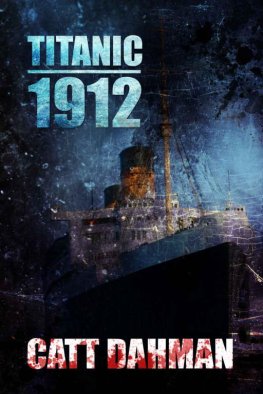
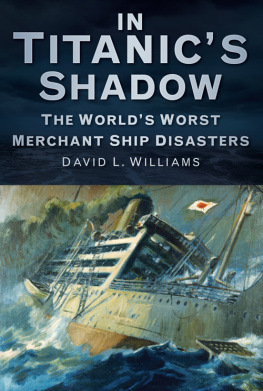
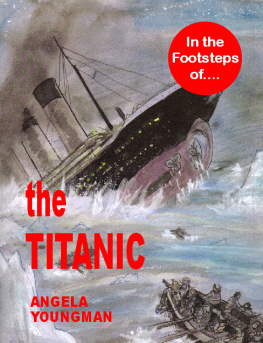



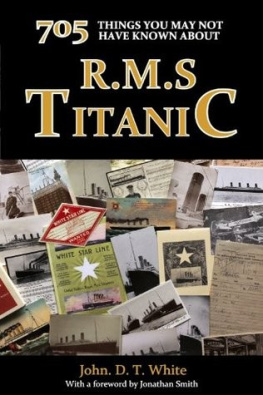
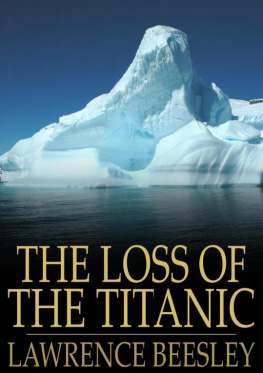



 Seventy-four years old in 1912, Henry Adams felt as much enthusiasm for crossing to Europe on the Titanic as an old man who believed that the world was collapsing could muster. The Titanic would leave New York on April 20, after its maiden voyage from England. I think I shall take rooms on it, by way of venture, Adams wrote his confidante Elizabeth Cameron. With the rivalry between William Howard Taft and Theodore Roosevelt splitting the Republican party, Adams was convinced now more than ever that society had become incapable of managing its own affairs. A trip to Paris, he hoped, would take his mind off the dismal state of politics and society. In March a British coal strike threatened to delay his escape, and April 20 seemed too far off as it was. I hope that it cant last beyond April 1, and that the Titanic will sail on time. If not, I shall be in a mess. The purpose of the strike, he imagined, was to prove the power of international organized labor, which one day soon would call a general strike and give the coup-de-grace to our society. Still, he hoped that the bothersome workers would save their coup de grace for later and that he would sail as planned. When he learned that the Titanic had set out on April 10, he felt certain that unless she drops me somewhere else, he would be in France in a fortnight.
Seventy-four years old in 1912, Henry Adams felt as much enthusiasm for crossing to Europe on the Titanic as an old man who believed that the world was collapsing could muster. The Titanic would leave New York on April 20, after its maiden voyage from England. I think I shall take rooms on it, by way of venture, Adams wrote his confidante Elizabeth Cameron. With the rivalry between William Howard Taft and Theodore Roosevelt splitting the Republican party, Adams was convinced now more than ever that society had become incapable of managing its own affairs. A trip to Paris, he hoped, would take his mind off the dismal state of politics and society. In March a British coal strike threatened to delay his escape, and April 20 seemed too far off as it was. I hope that it cant last beyond April 1, and that the Titanic will sail on time. If not, I shall be in a mess. The purpose of the strike, he imagined, was to prove the power of international organized labor, which one day soon would call a general strike and give the coup-de-grace to our society. Still, he hoped that the bothersome workers would save their coup de grace for later and that he would sail as planned. When he learned that the Titanic had set out on April 10, he felt certain that unless she drops me somewhere else, he would be in France in a fortnight.